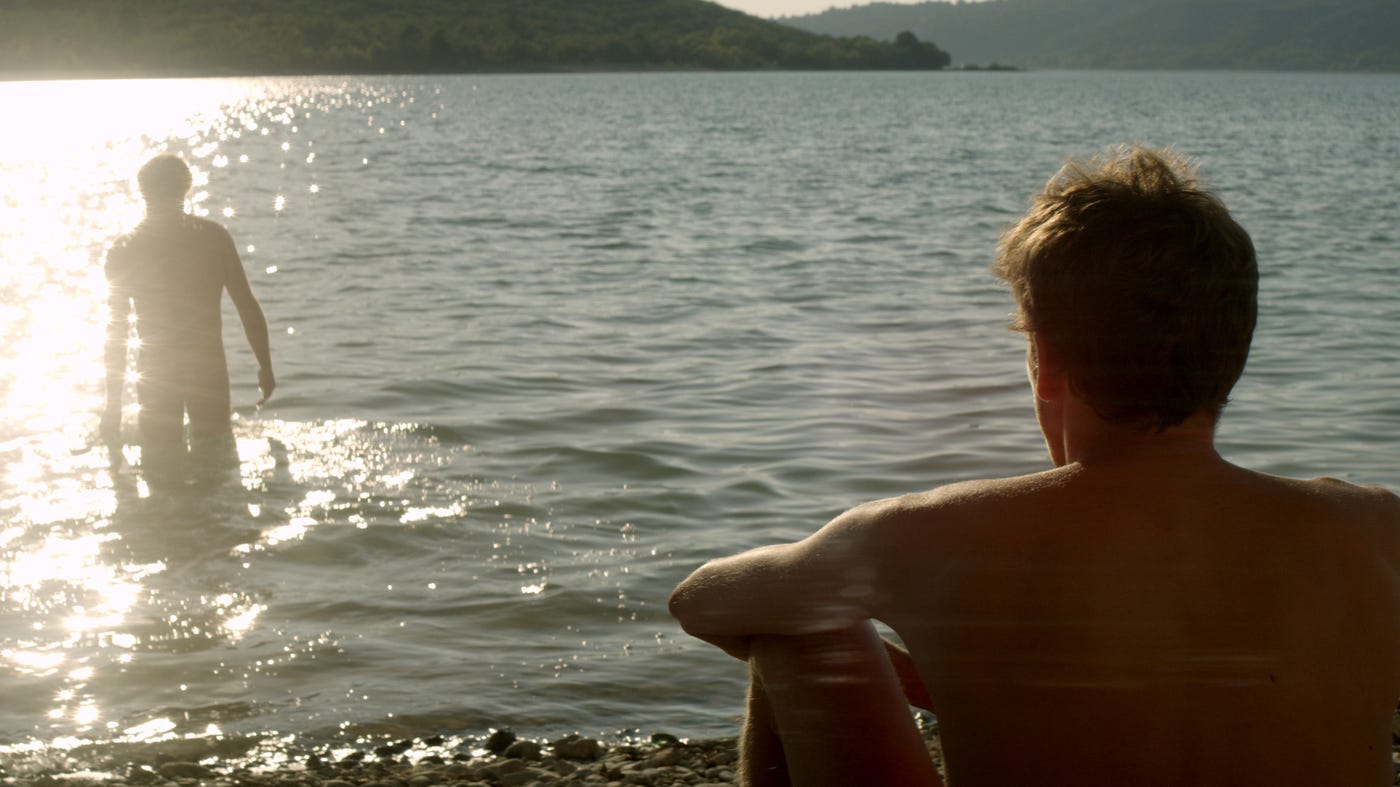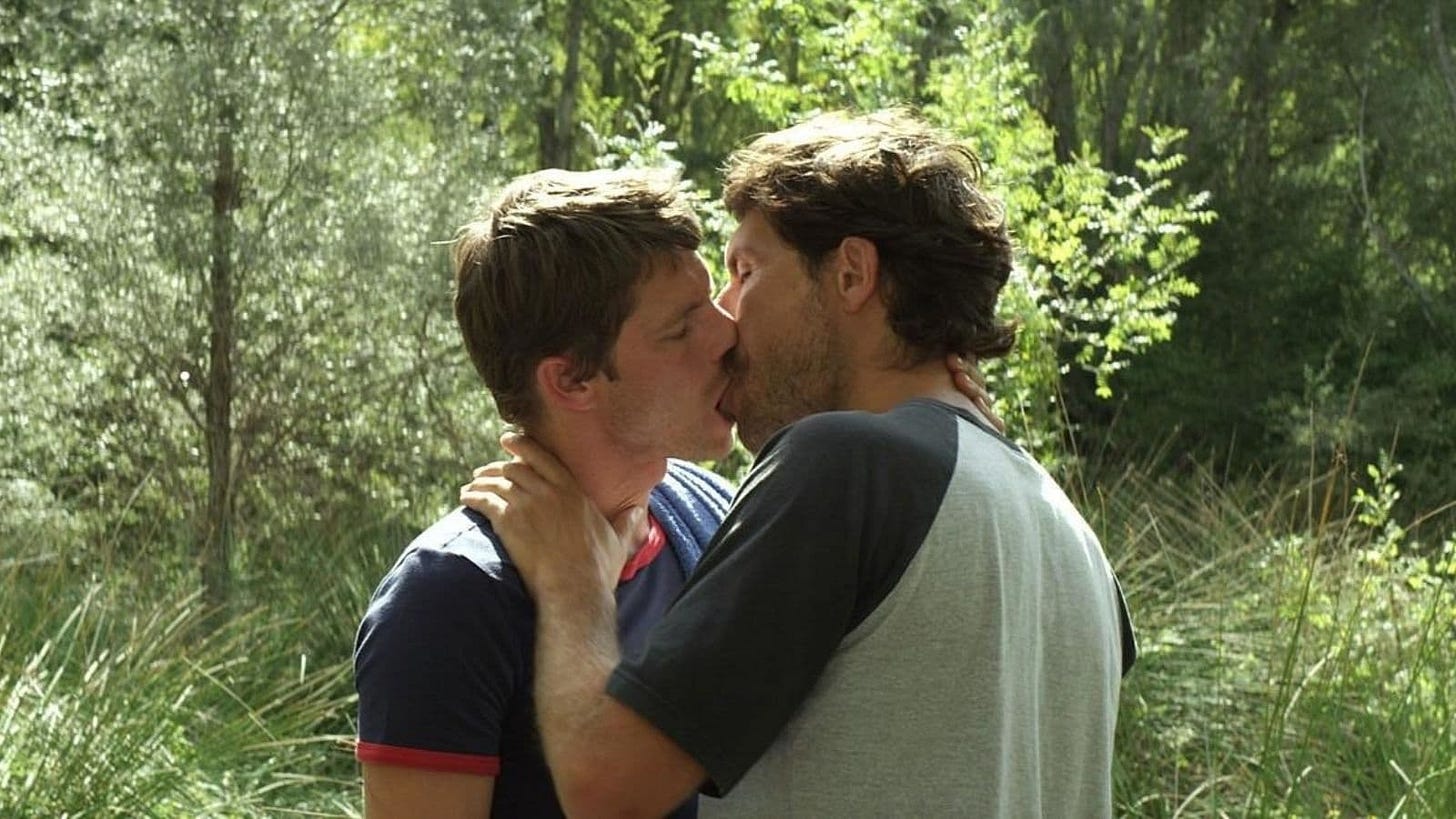Spoilers for Stranger by the Lake (2013).
In Alain Guiraudie’s explicit and thrilling film Stranger by the Lake, the theme of voyeurism is explored in all its benign and illicit forms. Taking place exclusively at a nude beach – which also doubles as a gay cruising spot – over several days, we see how the act of watching others can be comforting, erotic or dangerous.
Franck (Pierre Deladonchamps) is a regular at the beach, engaging with the others there and occasionally indulging in hookups. He strikes up a friendship with Henri (Patrick d'Assumçao), a lonely man who sits apart from the main beach and observes; his voyeurism distracts from his broken relationship, being entirely asexual and a way to pass his leave from work.
More uneasy is the voyeurism that Franck shows at a pivotal point in the film. Quickly infatuated with the attractive Michel (Christophe Paou), stays in the woods after a brief dalliance with another man and sees Michel murder another regular in the lake.
Guiraudie has a Hitchcockian sense of cinema, using a mix of closeups and wide shots, with minimal dialogue, to bring the desires of the characters to the fore. One way in which he does this is through contrast. During Franck’s sexual encounter, the camera stays close to his erect penis, watching it at the point of ejaculation. His lust is the primary driver – to such an extent that he suggests having sex without protection, trying to minimise his partner’s concerns over sexually transmitted diseases.
In contrast to this, the shot of Michel drowning his lover in the lake is shot wide, the two figures tiny against the backdrop. In part, this reflects Franck’s position as he watches from the woods, yet compared to the earlier scene, we can see how Franck minimises this event and focuses on his lust for Michel.
Indeed, throughout the rest of the film, Franck pursues a relationship with Michel, despite knowing how dangerous he is. He is blinded by lust, with their more serious moments often leading to, or being ignored for, a sexual encounter together. Similarly, to how the camera often moves in close to see a moment of pleasure between the men at the beach, Franck ignores the red flags in favour of his desires, just as the camera almost misses its pivotal murder in favour of the landscape.
As the tension builds, Franck is called for this by Henri. His watchful eye has seen and understood the growing danger, and he warns Franck that Michel is dangerous. The pair even admit budding romantic feelings, with Henri explaining that he is not interested in sex but would instead like to live with Franck; and sleep beside him; to soothe the loneliness for both.
The decisive moments of the film see Franck once again hidden in the bushes, watching Michel. The tension is higher now, Franck realising the danger he is in. Michel now is shown in closeup, just metres away from Franck’s hiding place. It is like the truth is now too clear to be ignored. This second moment of voyeurism from Franck is more wrought, more tense, and yet the ambiguous ending leaves us unsure if lust is still blinding the protagonist.
Once Michel has passed, leaving a trail of bloodshed in his wake, Franck stands out of the bushes. It is dark again, like the first time he observed Michel kill someone, and he calls out his name. His voice turns from anger to desperation, with the audience left in the dark (literally) about his desire to see Michel again, or his fate.
The subtext of Stranger by the Lake is up for debate. There is a clear link to the AIDS/HIV epidemic. No period is given for the film, yet the older cars and lack of modern technology, as well as the concern of some of the regulars over sexually transmitted diseases, could suggest that this is taking place at a time when fear of the disease was at a peak.
This feels too blunt for Guiraudie, however. The sex = death mentality clashes with the frankness of the rest of the film. These characters are not judged for finding consensual, no-strings sex, nor does Guiraudie concern himself with the potential consequences of them. Even voyeurism is not vilified, despite the various connotations. Several of the characters are shown to be voyeurs, each with different motivations.
If there is a message to take away from the film, it has more to do with paying attention to the details. Franck sees what he wants to see throughout, ignoring the clear danger he is putting himself in.
Writer/Director: Alain Guiraudie
Starring: Pierre Deladonchamps, Christophe Paou, Patrick d'Assumçao









